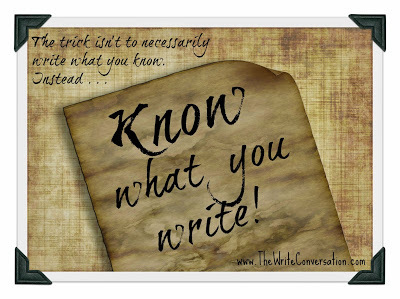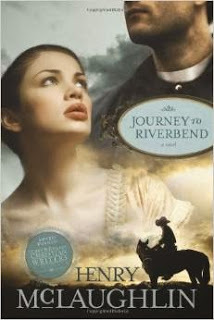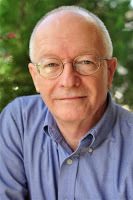Know What You Write
by Henry McLaughlin @RiverbendSagas
 Many of us have heard the statement, “Write what you know” so often it has become a cliché.
Many of us have heard the statement, “Write what you know” so often it has become a cliché.
It intimidated me the first time I heard. Write what I know? I don’t know all that much that would make a good story. To me, my life was the opposite of Hitchcock’s definition of a movie: life with the dull parts taken out. Mine had all the dull parts left in. I’d had some traumatic and horrific experiences, like the death of a son. Fighting the siren song of alcohol. Making decisions in my work in public child welfare that would change a child’s life forever. All were—and many still are—too close, the emotions too raw.
Besides, I wanted to write what I enjoy: stories with mystery and suspense in unique story worlds.
Then the revelation came: Know What I Write.
 When I had the idea for my first novel, Journey to Riverbend, I knew it would be either Science Fiction or a Western. The novel needed a significant amount of time to pass where the characters would be out of communication. These two genres were the best fit.
When I had the idea for my first novel, Journey to Riverbend, I knew it would be either Science Fiction or a Western. The novel needed a significant amount of time to pass where the characters would be out of communication. These two genres were the best fit.
And, because they were two of my most favorite genres to read, I had a head start and was into that second cliché of writing: Read what you write. Study your genre, see what the expectations are, learn how story worlds are built and populated.
I also needed to know how to write: Studying the craft came next. Books, magazines, workshops, conferences. The Christian Writers Guild courses of Apprentice, Journeyman, and Craftsman. Being led to a generous mentor, finding critique partners and groups.
Knowing what I write also means research. For Journey to Riverbend, this meant digging into weapons, stagecoaches, trains, the economy, and religion. Being a history major in college, the research methods were still there. Just a tad rusty but a little mental WD-40 and they came back. And so much easier with the Internet.
 Write what you know is still excellent advice. Those true life stories I mentioned earlier do come out in my writing. Digging into my own experiences helps me discover those emotions and conflicts I want to place in my characters. What fear feels like to me helps me show it in my characters.
Write what you know is still excellent advice. Those true life stories I mentioned earlier do come out in my writing. Digging into my own experiences helps me discover those emotions and conflicts I want to place in my characters. What fear feels like to me helps me show it in my characters.
Any feeling we ever experience is still in us, in our memory, ready to help develop real and complex characters. Pull it out, make it worse for our character and put it in the book.
Knowing what you write is equally valuable in making what you know a meaningful experience for your reader.What are some techniques you’ve discovered to help you know what you write?
How do you use what you know to improve your story telling? Be sure to share your thoughts in the comments section below.
TWEETABLE
Don't stop with write what you know, KNOW what you write - Henry McLaughlin @RiverbendSagas (Click to Tweet)
Turn "Write what you know" upside down with Henry McLaughlin, @Riverbendsagas on @EdieMelson (Click to Tweet)
 Henry’s debut novel, Journey to Riverbend, won the 2009 Operation First Novel contest. He serves as Associate Director of North Texas Christian Writers. Henry edits novels, leads critique groups, and teaches at conferences and workshops. He enjoys mentoring and coaching individual writers. Connect with Henry on his blog, Twitter and Facebook.
Henry’s debut novel, Journey to Riverbend, won the 2009 Operation First Novel contest. He serves as Associate Director of North Texas Christian Writers. Henry edits novels, leads critique groups, and teaches at conferences and workshops. He enjoys mentoring and coaching individual writers. Connect with Henry on his blog, Twitter and Facebook.
 Many of us have heard the statement, “Write what you know” so often it has become a cliché.
Many of us have heard the statement, “Write what you know” so often it has become a cliché.It intimidated me the first time I heard. Write what I know? I don’t know all that much that would make a good story. To me, my life was the opposite of Hitchcock’s definition of a movie: life with the dull parts taken out. Mine had all the dull parts left in. I’d had some traumatic and horrific experiences, like the death of a son. Fighting the siren song of alcohol. Making decisions in my work in public child welfare that would change a child’s life forever. All were—and many still are—too close, the emotions too raw.
Besides, I wanted to write what I enjoy: stories with mystery and suspense in unique story worlds.
Then the revelation came: Know What I Write.
 When I had the idea for my first novel, Journey to Riverbend, I knew it would be either Science Fiction or a Western. The novel needed a significant amount of time to pass where the characters would be out of communication. These two genres were the best fit.
When I had the idea for my first novel, Journey to Riverbend, I knew it would be either Science Fiction or a Western. The novel needed a significant amount of time to pass where the characters would be out of communication. These two genres were the best fit.And, because they were two of my most favorite genres to read, I had a head start and was into that second cliché of writing: Read what you write. Study your genre, see what the expectations are, learn how story worlds are built and populated.
I also needed to know how to write: Studying the craft came next. Books, magazines, workshops, conferences. The Christian Writers Guild courses of Apprentice, Journeyman, and Craftsman. Being led to a generous mentor, finding critique partners and groups.
Knowing what I write also means research. For Journey to Riverbend, this meant digging into weapons, stagecoaches, trains, the economy, and religion. Being a history major in college, the research methods were still there. Just a tad rusty but a little mental WD-40 and they came back. And so much easier with the Internet.
 Write what you know is still excellent advice. Those true life stories I mentioned earlier do come out in my writing. Digging into my own experiences helps me discover those emotions and conflicts I want to place in my characters. What fear feels like to me helps me show it in my characters.
Write what you know is still excellent advice. Those true life stories I mentioned earlier do come out in my writing. Digging into my own experiences helps me discover those emotions and conflicts I want to place in my characters. What fear feels like to me helps me show it in my characters. Any feeling we ever experience is still in us, in our memory, ready to help develop real and complex characters. Pull it out, make it worse for our character and put it in the book.
Knowing what you write is equally valuable in making what you know a meaningful experience for your reader.What are some techniques you’ve discovered to help you know what you write?
How do you use what you know to improve your story telling? Be sure to share your thoughts in the comments section below.
TWEETABLE
Don't stop with write what you know, KNOW what you write - Henry McLaughlin @RiverbendSagas (Click to Tweet)
Turn "Write what you know" upside down with Henry McLaughlin, @Riverbendsagas on @EdieMelson (Click to Tweet)
 Henry’s debut novel, Journey to Riverbend, won the 2009 Operation First Novel contest. He serves as Associate Director of North Texas Christian Writers. Henry edits novels, leads critique groups, and teaches at conferences and workshops. He enjoys mentoring and coaching individual writers. Connect with Henry on his blog, Twitter and Facebook.
Henry’s debut novel, Journey to Riverbend, won the 2009 Operation First Novel contest. He serves as Associate Director of North Texas Christian Writers. Henry edits novels, leads critique groups, and teaches at conferences and workshops. He enjoys mentoring and coaching individual writers. Connect with Henry on his blog, Twitter and Facebook.
Published on May 28, 2015 01:00
No comments have been added yet.



